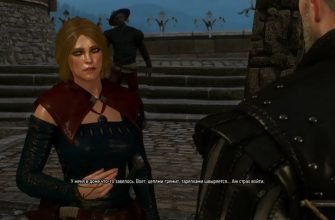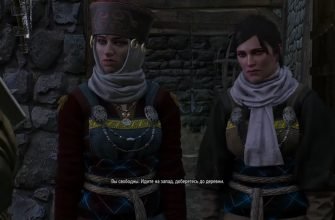In CD Projekt Red’s “The Witcher 3: Wild Hunt,” players face numerous moral quandaries, none more so than in the Hearts of Stone (HoS) expansion, where Geralt deals with a pact between Olgierd von Everec and Gaunter O’Dimm. This pivotal decision reverberates through the narrative, challenging players to weigh the consequences of their choices. The question remains: should players save Olgierd from his pact with Gaunter O’Dimm, or allow the latter to claim his due? This article examines this quandary from multiple perspectives to distinguish what might be the most just course of action.
Understanding the Context: Who Are Olgierd and Gaunter O’Dimm?
Before delving into the decision itself, it’s crucial to understand the characters involved. Olgierd von Everec, the central character in HoS, is a man who made a pact with Gaunter O’Dimm in a moment of desperation. O’Dimm, often likened to the devil incarnate, is an enigmatic and powerful figure who delights in striking Faustian bargains. His contracts come with a heavy price, often ensnaring those who are desperate or unwary. Olgierd’s pact grants him immortality but at the cost of losing his emotions, effectively turning his heart to stone.
The story reveals that Olgierd, before his transformation, was a man driven by love and desperation. His decision to strike a deal with Gaunter O’Dimm resulted from his desire to restore his family’s lost wealth and to secure a future with his beloved wife, Iris. However, the consequences of the pact lead to tragic outcomes, including the estrangement and eventual demise of Iris. Gaunter O’Dimm, on the other hand, remains a mystery. While some argue he simply reflects the nature of those engaging with him, his manipulations and enjoyment of human suffering make him a significant threat.
Choice Dynamics: The Decision at Hand
Players are faced with a choice at the culmination of Olgierd’s storyline. They must decide to either save Olgierd by outwitting Gaunter O’Dimm or let the enigmatic figure claim his due. The consequences of this choice are purely narrative, as the game does not impose long-term penalties or benefits on the player’s progress or Geralt’s abilities. Nonetheless, this decision is profound, emotionally weighting plot continuity and character development.
The choices are influenced by several factors, including players’ moral compasses, their interpretations of the characters, and their personal notions of justice and retribution.
Arguments for Saving Olgierd
The decision to save Olgierd can be seen as an act of compassion and a thwarting of Gaunter O’Dimm’s malevolent influence. Here are key arguments supporting this choice:
- Moral Redemption: Players might feel that saving Olgierd allows him a chance for redemption. Despite his past misdeeds, which are often characterized by his heartless behavior post-pact, Olgierd shows remorse and a desire to change by the end of the expansion. Redemption is a powerful theme in storytelling, and the possibility for Olgierd to mend his ways presents a hopeful narrative.
- Honoring Iris’s Memory: Olgierd’s relationship with his wife, Iris, is central to his character arc. Players might conclude that saving him is what Iris would have desired, as she appeared to love him despite their tumultuous relationship. Her haunting presence and the subtle hints of her enduring affection could compel players to act in Olgierd’s favor, fulfilling what might be her unspoken wishes.
- Opposing O’Dimm: Gaunter O’Dimm is a formidable antagonist who revels in the manipulation and ruin of those who cross his path. By intervening, Geralt undermines O’Dimm’s machinations, which aligns with his Witcher code to confront and dismantle evil forces. This further elevates the narrative as Geralt takes a stand against what might be an embodiment of pure malevolence.
Arguments for Letting O’Dimm Claim Olgierd
On the other hand, allowing O’Dimm to take Olgierd could be seen as letting justice run its course. Here are the arguments supporting this decision:
- Consequences of Actions: Olgierd made his choices, including the pact with O’Dimm, fully aware of the potential consequences. Players might perceive letting O’Dimm take him as a form of justice or a reflection of the adage “be careful what you wish for.” It emphasizes that actions have consequences, and meddling with forces beyond one’s understanding leads to inevitable outcomes.
- Moral Complexity: The character of Olgierd von Everec is multifaceted, and his transformation into a villain was not solely because of his pact but also due to his innate characteristics. By removing him from the world, players might feel they are contributing to a just resolution, given his history of morally ambiguous actions.
- The Nature of O’Dimm: Some players argue that Gaunter O’Dimm isn’t evil in a traditional sense but instead functions as a catalyst revealing people’s true natures. In this view, Olgierd’s fate is a reflection of his own character flaws rather than just O’Dimm’s influence. This perception prioritizes the natural order of reaping what one sows, viewing Geralt’s involvement as unnecessary interference.
The Psychological and Philosophical Undertones
The choice to save or sacrifice Olgierd highlights deeper philosophical themes prevalent in “The Witcher” series. These themes often revolve around the complexity of human morality, free will, and the nature of evil.
- Free Will versus Fate: The narrative suggests a conflict between exercising free will and succumbing to fate. Olgierd’s plight resonates with this struggle, as his pact signifies how individuals might seal their fates through free choices. Players, acting through Geralt, are faced with the dilemma of defying fate or letting it unfold.
- Redemption and Forgiveness: Characters in “The Witcher” often possess a duality, embodying both vice and virtue. The possibility of redemption plays a significant role here. Is Olgierd worth saving despite his transgressions? Or is his downfall an opportunity to affirm a moral standpoint that acknowledges both punishment and the potential for forgiveness?
- Questioning the Nature of Evil: Gaunter O’Dimm embodies the notion that evil can be pervasive and tempting, mechanical in its efficiency but complex in its reasoning. The decision to thwart him or allow him victory is a narrative commentary on dealing with malevolent forces, challenging players to consider where they stand in the eternal battle between good and evil.
Community Perspectives and Player Decisions
Based on player discussions across forums and online platforms, it’s evident many gravitate towards saving Olgierd, influenced heavily by their perceptions of justice and the narratives they wish to explore. Here’s a breakdown of some typical player viewpoints:
| Decision | Rationale |
|---|---|
| Save Olgierd | Driven by a desire for moral redemption, opposing Gaunter O’Dimm, and honoring Iris’s implied wishes. This choice resonates with players who aim to end their journey in HoS on a redemptive note. |
| Let O’Dimm Claim Olgierd | Emphasizes the importance of moral consequences, respects contractual obligations, and demonstrates a perspective that Olgierd’s own actions led to his downfall. This choice reflects a pragmatic approach to justice in a world filled with moral grey areas. |
Conclusion: A Reflection on Rightness
The choice of whether to save Olgierd or let Gaunter O’Dimm claim his soul ultimately mirrors the broader themes of “The Witcher” series – ambiguity, moral complexity, and the influence of personal interpretation on narrative outcomes. Each decision carries its own rationale and emotional weight, inviting players to reflect on their morals and the virtual world they inhabit. Whether players lean towards redemption and resistance against evil or endorse inevitable consequences and justice, the decision is a testament to “The Witcher’s” intricate storytelling and immersive world-building that challenges players to ponder what it means to make the “right” choice.









